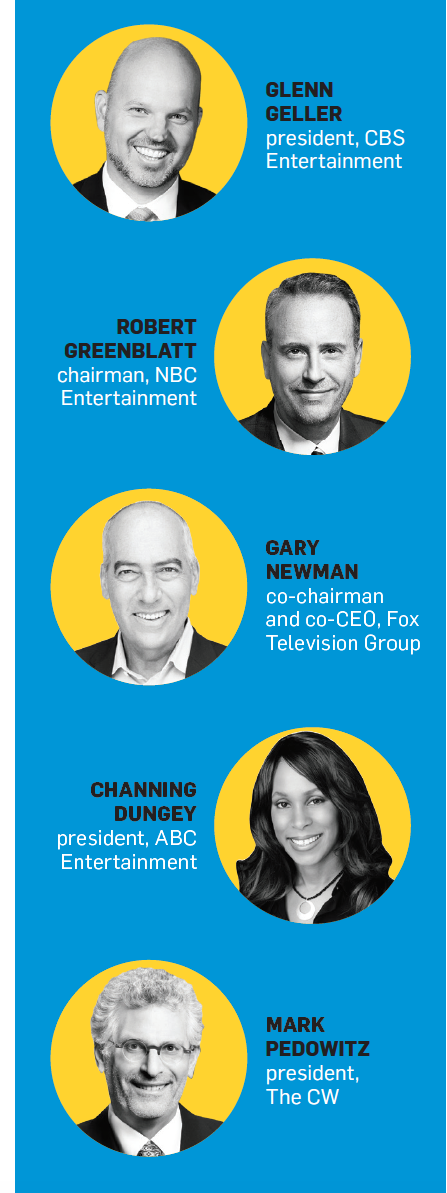Mark your calendar for Mediaweek, October 29-30 in New York City. We’ll unpack the biggest shifts shaping the future of media—from tv to retail media to tech—and how marketers can prep to stay ahead. Register with early-bird rates before sale ends!
After a season where none of the five broadcast networks grew their 18-49 audience (and ABC, Fox and NBC lost viewers in that demo), they will try to reverse that trend in the 2016-17 season, which officially kicks off Sept. 19. Over the next six weeks, the nets will roll out 20 new shows, plus 61 returning series. Adweek sat down with each of the network chiefs to talk about their strategy for the new season.
 Adweek: What's your most improved time slot this fall?
Adweek: What's your most improved time slot this fall?
Glenn Geller, president, CBS Entertainment: We have a real opportunity this year to grow a number of time periods: Fridays at 8 [with MacGyver], Tuesdays at 9 and 10 [with Bull and the relocated NCIS: New Orleans] and Mondays at 8 [with Kevin Can Wait and Man With a Plan].
Robert Greenblatt, chairman, NBC Entertainment: Thursdays at 9. Thursday is a night that we're reconfiguring, and Chicago Med is a really strong show that I hope will bring an audience with it to that time period. It wasn't doing badly with [The] Blacklist, but with Blacklist at 10 and Chicago Med in front of it, that time period could be improved.
Gary Newman, co-chairman and co-CEO, Fox Television Group: I would expect it to be Wednesdays at 8, with Lethal Weapon.
Channing Dungey, president, ABC Entertainment: Wednesdays at 10, with Designated Survivor.
Mark Pedowitz, president, The CW: Mondays at 8 [with Supergirl, which The CW picked up from CBS]. A quality show, which has an audience base that fits into who we are. Monday at 8 helps set up the whole week and helps Jane [the Virgin, at 9].
This season, what's your biggest challenge?
Geller, CBS: We have a larger-than-normal amount of new shows. For as stable as our schedule is, it's not that often that we're launching six new shows. Part of that is because we're expanding to eight comedies.
Greenblatt, NBC: It's the same challenge as always, which is just trying to get multiple shows off the ground at the same time in a universe that's really, really crowded. The good news for us is that we only have three shows to do that with [in the fall], as opposed to half a dozen.
Newman, Fox: The volume of shows we need to launch this year. We ordered 11 scripted shows, and some unscripted as well, so it's a lot of new content. Part of that is a result of American Idol leaving our air. So we have a lot of marketing messages to get out. That's why we spread our launches out so much.
Dungey, ABC: Opening up a new night of comedy on Tuesday, a four-stack.
Pedowitz, The CW: Getting people to watch Crazy Ex-Girlfriend.
What keeps you up the most at night?
Geller, CBS: It's balancing two things: wanting to tell the best stories and remembering who our audience is.
Greenblatt, NBC: How do we chase the audience, which doesn't mean necessarily how do we get more people to watch our network when we program shows the old-fashioned linear way, but how do we respond to where they want to watch and make that a good business for us? We've got to be able to figure out how to give people those shows when they want them, but also get credit and money for them.
Newman, Fox: As always, it's about finding shows that resonate and break through with big, unique, bold ideas.
Dungey, ABC: It's a very crowded marketplace, and wanting to make sure that the shows that we believe in are getting enough attention.
Pedowitz, The CW: For me, it's what happens in the spectrum auction and how it impacts The CW and everything else. At this moment, we don't have any idea of the implications of it all.
How are you trying to attract millennials?
Geller, CBS: Our philosophy is the same, which is, make the best quality shows and have them appeal to the broadest audience, and that way, we invite everyone in. We have a number of shows that should be more appealing to millennials, like The Great Indoors, but our philosophy really is to cast as wide a net as possible and people will fall into that net.
Greenblatt, NBC: Ariana Grande [in December's Hairspray Live] is a good start. And our NBC comedies. Parks and Rec[reation] was the youngest show on broadcast television, and I think [creator Mike Schur, who also created The Good Place] speaks to that younger audience, like Superstore does. So that's our secret weapon. You're going to see young women come to those shows—hopefully!
Newman, Fox: We try to have diverse programs from a racial standpoint, from a gender standpoint, from an age standpoint, so that as people watch, they can see characters and issues that resonate for them. But we're a broadcast network and are trying to deliver broad programming that appeals to multiple ages, that families can watch together.
Dungey, ABC: We want to have shows that have the broadest possible reach. One of the reasons I'm so excited about Designated is I feel that's a show that appeals across the board to men, women, old and young. And we want to continue to broaden our programming in that way.
Pedowitz, The CW: We're the youngest-skewed broadcast network, with a median age of 43. But we're also a bifurcated network, because our digital median age is 23. So we recognize that we are rooted in broadcasting, but we're a true hybrid. We're digital leaders in this world, and we accept that.
Finish this sentence: Advertisers will love this season because …
Geller, CBS: It appeals to the widest audience, and we know CBS will win 18-49.
Greenblatt, NBC: This Is Us is an advertiser's dream.
Newman, Fox: We give them so many varied choices. We have very distinct programs, and each one has its own area of specificity. Lethal Weapon couldn't be more different than The Exorcist, which couldn't be more different than Pitch.
Dungey, ABC: Our reach is broad and our quality is terrific.
Pedowitz, The CW: It is our strongest schedule ever.

This story first appeared in the September 19, 2016 issue of Adweek magazine.








